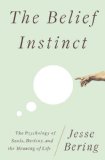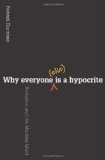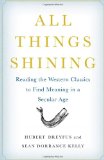January 22, 2011

Reality Is Broken: Why Games Make Us Better and How They Can Change the World by Jane McGonigal (Penguin, 2011)
(kindle edition)
(amazon.co.uk)
Visionary game designer Jane McGonigal reveals how we can harness the power of games to solve real-world problems and boost global happiness.
More than 174 million Americans are gamers, and the average young person in the United States will spend ten thousand hours gaming by the age of twenty-one. According to world-renowned game designer Jane McGonigal, the reason for this mass exodus to virtual worlds is that videogames are increasingly fulfilling genuine human needs. In this groundbreaking exploration of the power and future of gaming, McGonigal reveals how we can use the lessons of game design to fix what is wrong with the real world.
Drawing on positive psychology, cognitive science, and sociology, Reality Is Broken uncovers how game designers have hit on core truths about what makes us happy and utilized these discoveries to astonishing effect in virtual environments. Videogames consistently provide the exhilarating rewards, stimulating challenges, and epic victories that are so often lacking in the real world. But why, McGonigal asks, should we use the power of games for escapist entertainment alone? Her research suggests that gamers are expert problem solvers and collaborators because they regularly cooperate with other players to overcome daunting virtual challenges, and she helped pioneer a fast-growing genre of games that aims to turn gameplay to socially positive ends.
In Reality Is Broken, she reveals how these new alternate reality games are already improving the quality of our daily lives, fighting social problems such as depression and obesity, and addressing vital twenty-first-century challenges-and she forecasts the thrilling possibilities that lie ahead. She introduces us to games like World Without Oil, a simulation designed to brainstorm-and therefore avert- the challenges of a worldwide oil shortage, and Evoke, a game commissioned by the World Bank Institute that sends players on missions to address issues from poverty to climate change.
McGonigal persuasively argues that those who continue to dismiss games will be at a major disadvantage in the coming years. Gamers, on the other hand, will be able to leverage the collaborative and motivational power of games in their own lives, communities, and businesses. Written for gamers and nongamers alike, Reality Is Broken shows us that the future will belong to those who can understand, design, and play games.
See also: Author’s website
Comments (2)
- culture,new books,reality
January 17, 2011

The Belief Instinct: The Psychology of Souls, Destiny, and the Meaning of Life by Jesse Bering (W.W. Norton, 2011)
(kindle)
(UK ed. ‘The God Instinct’ at amazon.co.uk)
Product description from the publisher:
A surprising new take on why we believe in God—and how this belief ensured the survival of the human species.
God is not merely an idea to be entertained or discarded based on the evidence. Nor is God a cultural invention, an existential Band-Aid, or an opiate of the masses. Instead, Jesse Bering argues, belief in God evolved in the human species as an “adaptive illusion.” Drawing on groundbreaking research in cognitive science, The Belief Instinct unravels the evolutionary mystery of why we grapple for meaning, purpose, and destiny in our everyday lives. Bering argues that the strangely deep-rooted sense that some intentional agent created us as individuals, wants us to behave in particular ways, observes our otherwise private actions, and intends to meet us after we die would also have been felt by our ancestors, leading them to behave in ways that favored their reputations—and thus saved their genes. But in today’s world, these psychological illusions have outlasted their evolutionary purpose, and Bering draws our attention to a whole new challenge: escaping them.
See also: Author’s website
Comments (0)
- culture,new books,psychology
January 16, 2011

Why Everyone (Else) Is a Hypocrite: Evolution and the Modular Mind by Robert Kurzban (Princeton University Press, 2011)
(kindle)
(at amazon.co.uk)
We’re all hypocrites. Why? Hypocrisy is the natural state of the human mind.
Robert Kurzban shows us that the key to understanding our behavioral inconsistencies lies in understanding the mind’s design. The human mind consists of many specialized units designed by the process of evolution by natural selection. While these modules sometimes work together seamlessly, they don’t always, resulting in impossibly contradictory beliefs, vacillations between patience and impulsiveness, violations of our supposed moral principles, and overinflated views of ourselves.
This modular, evolutionary psychological view of the mind undermines deeply held intuitions about ourselves, as well as a range of scientific theories that require a “self” with consistent beliefs and preferences. Modularity suggests that there is no “I.” Instead, each of us is a contentious “we”–a collection of discrete but interacting systems whose constant conflicts shape our interactions with one another and our experience of the world.
In clear language, full of wit and rich in examples, Kurzban explains the roots and implications of our inconsistent minds, and why it is perfectly natural to believe that everyone else is a hypocrite.
See also: Author’s webpage, “Modularity of mind” at Wikipedia
Comments (0)
- mind,new books,psychology
January 9, 2011

All Things Shining: Reading the Western Classics to Find Meaning in a Secular Age by Herbert Dreyfus & Sean Dorrance Kelly (Free Press, 2011)
(kindle ed.)
(link for amazon.co.uk)
Product description from the publisher:
An unrelenting flow of choices confronts us at nearly every moment of our lives, and yet our culture offers us no clear way to choose. This predicament seems inevitable, but in fact it’s quite new. In medieval Europe, God’s calling was a grounding force. In ancient Greece, a whole pantheon of shining gods stood ready to draw an appropriate action out of you. Like an athlete in “the zone,” you were called to a harmonious attunement with the world, so absorbed in it that you couldn’t make a “wrong” choice. If our culture no longer takes for granted a belief in God, can we nevertheless get in touch with the Homeric moods of wonder and gratitude, and be guided by the meanings they reveal? All Things Shining says we can. Hubert Dreyfus and Sean Dorrance Kelly illuminate some of the greatest works of the West to reveal how we have lost our passionate engagement with and responsiveness to the world. Their journey takes us from the wonder and openness of Homer’s polytheism to the monotheism of Dante; from the autonomy of Kant to the multiple worlds of Melville; and, finally, to the spiritual difficulties evoked by modern authors such as David Foster Wallace and Elizabeth Gilbert. Dreyfus, a philosopher at the University of California, Berkeley, for forty years, is an original thinker who finds in the classic texts of our culture a new relevance for people’s everyday lives. His lively, thought-provoking lectures have earned him a podcast audience that often reaches the iTunesU Top 40. Kelly, chair of the philosophy department at Harvard University, is an eloquent new voice whose sensitivity to the sadness of the culture—and to what remains of the wonder and gratitude that could chase it away—captures a generation adrift. Re-envisioning modern spiritual life through their examination of literature, philosophy, and religious testimony, Dreyfus and Kelly unearth ancient sources of meaning, and teach us how to rediscover the sacred, shining things that surround us every day. This book will change the way we understand our culture, our history, our sacred practices, and ourselves. It offers a new—and very old—way to celebrate and be grateful for our existence in the modern world.
See also: Book website & blog
Comments (1)
- culture,new books
January 8, 2011

Something I haven’t experienced in awhile…
Attention Is Cognitive Unison: An Essay in Philosophical Psychology (Philosophy of Mind Series) by Christopher Mole (Oxford University Press, USA, 2011)
(kindle),
(amazon.co.uk)
Product description from the publisher:
Some psychological phenomena can be explained by identifying and describing the processes that constitute them. Others cannot be explained in that way. In Attention is Cognitive Unison Christopher Mole gives a precise account of the metaphysical difference that divides these two categories and shows that, when current psychologists attempt to explain attention, they assign it to the wrong one.
Having rejected the metaphysical approach taken by our existing theories of attention Mole then develops a new theory. According to this theory the question of whether someone is paying attention is not settled by the facts about which processes are taking place. It is settled by the facts about whether the processes that serve that person’s task– whichever processes those happen to be–are processes that operate in unison. This theory gives us a new account of the problems that have dogged debates about the psychology of attention since the middle of the twentieth century. It also gives us a new way to understand the explanatory importance of cognitive psychology’s empirical findings. The book as whole shows that metaphysical questions have a foundational role to play in the explanatory project of cognitive psychology.
This volume is of interest to anyone engaged in current debates in the philosophy of mind and perception, and in cognitive science generally.
See also: Author’s homepage
Preview via Google Books:
Comments (0)
- cognitive science,philosophy of mind,psychology







